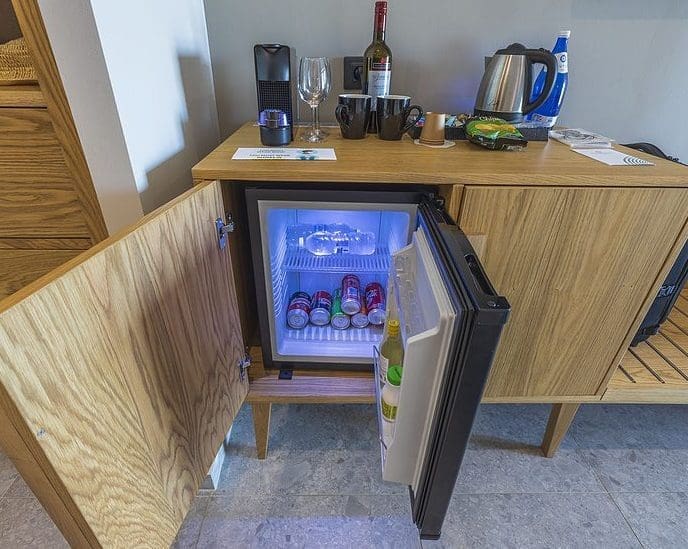Condoms, baby food, and medicine do not belong in a minibar for good reasons! Here are some important safety tips based on my experience with health & safety and security audits.
1. Never store condoms in a minibar
Just when you think you are safe, you could be sorry! I was surprised to discover during hotel security audits that often condoms are stored in minibars, even in the best hotels in the world. Reasons for doing so are varied, including to provide another service to guests, to keep the product away from children, because of automatic billing or simply because “Why shouldn’t we?”. All might be based on good intentions, but it shows a lack of product knowledge that could put people at risk.
Including condoms in the minibar product range began in good faith – to provide more ‘guest safety.’ But this service can actually have quite the opposite effect, if the product is not stored correctly. Condoms are mostly made out of latex and the quality of the material will degrade over time. Condoms should always be stored in a cool, dry place, but preferably at room temperature. Fridges are far too cold for storing condoms. There is a good chance they will crack or rip. It is a fact that rubber gets stiff the colder it is.
In the case of an incident where an unwanted pregnancy is a result of a compromised condom supplied by the hotel, or there is the transmission of disease, lawyers in some countries would look at the liability aspect if it can be proved it happened because of the wrong storage procedures set by the hotel. The hotel is the product provider and is responsible for storing it correctly and ensuring there is no damage before use.
2. Baby food and medicine in the minibar fridge
Because of temperature concerns, not all hotel minibars are suitable for storing baby food. Operating minibar fridges costs hotels a lot of money. To save on energy costs, hotels often raise the temperature setting to +8-14 C°. This saves a lot of money in the long run and cools beverages down to an acceptable drinking temperature, but this is not cold enough to safely store baby food.
Baby food must be kept cool at +4-5 C° to avoid spoiling. The problem is that the parent assumes the fridge runs on a temperature of +4-5 C° like at home. For safety reasons, I strongly advise every hotel to label the minibar fridge with the set running temperature.
What applies to baby food is also important for some medicines that require cold storage. In this case, the user/ hotel guest must be notified when the fridge runs on an energy-saving temperature. However, the storage problem for baby food and medicine is not completely solved with a safety label on the fridge. This is why some hotels offer guests a storage facility in the kitchen or bar that is at the proper temperature. But be careful; access control and verification play an important part in ensuring the safety and security of the products.
3. Contamination
All items in the minibar should be checked before the next guest’s check-in. Minibar products, in particular alcoholic beverages, are delivered in sealed containers. Gin or vodka products have a natural, clear colour and are popular items with some young guests who have been known, after drinking the contents, to fill up the bottles with water. Other spirits have colour and have been known to be refilled with unidentified liquids. Product safety here is a concern. If minibar beverage seals are not checked, then the next guest could experience serious illness caused by contamination of a minibar item.
Worldwide, different solutions are in place to address these risks. Some hotels place their own seal on top of each item; in some countries, alcoholic beverages are sealed with wax. Other hotels keep the minibar empty and refill it only upon request. Whatever system works best, it is important that guests can identify a broken seal instantly, preventing consumption of the contaminated product. It is a matter of a duty of care and avoiding legal complications.
About the author
 Stefan Vito Hiller is the Founder & Managing Director of Sky Touch – Global Hotel Security Consulting. He has over 20 years of international experience in the hotel industry, including five years in security.
Stefan Vito Hiller is the Founder & Managing Director of Sky Touch – Global Hotel Security Consulting. He has over 20 years of international experience in the hotel industry, including five years in security.His hotel experience includes rooms division management, pre-opening, fire, health & safety, risk management & cost control. He has worked for leading hotel brands in the Middle East in Munich, Frankfurt, Bremen, Berlin, Cork, Edinburgh and Doha.
He graduated in 2002 as a Hotel Management Consultant at the Steigenberger Hotel Management School. He gained valuable experience as a Cost Controller at the Sheraton Hotel & Towers at Frankfurt Airport. He worked three years in Ireland, building on his experience as a former volunteer fire officer and becoming a qualified IOSH Health & Safety Officer. He effectively combined the field of Health & Safety with his Assistant Manager positions.
Stefan now consults to hotels to implement innovative and affordable strategies to raise their level of security to meet growing global demands.
































